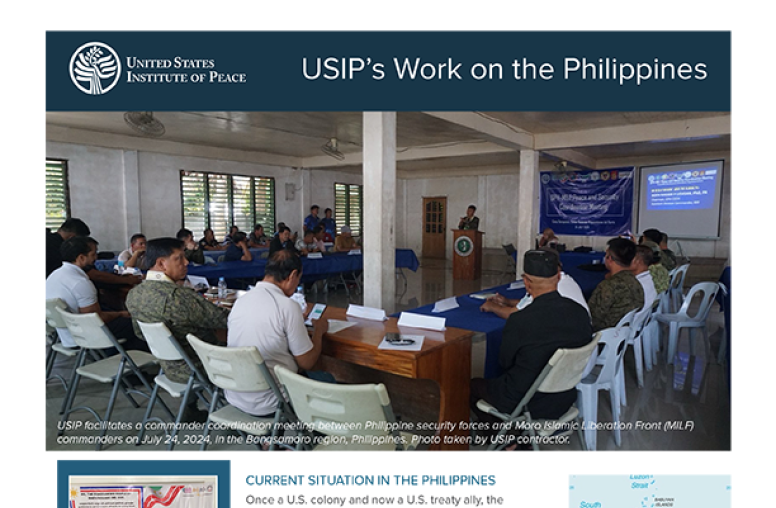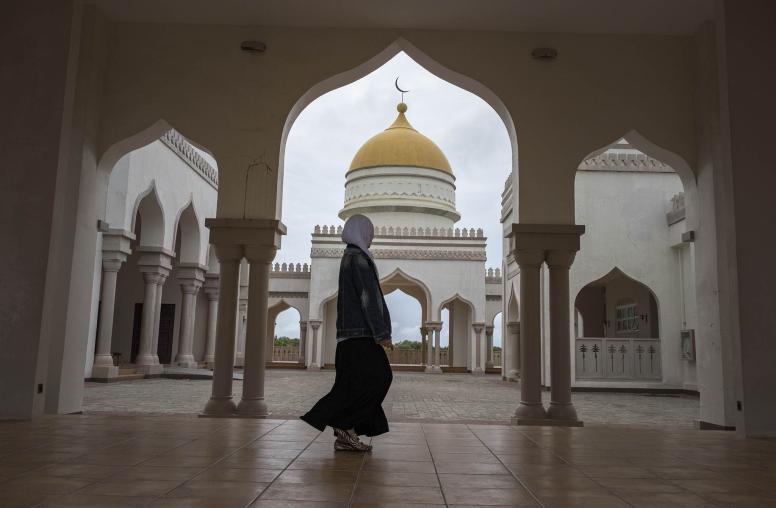The Importance of Settling Clan Feuds for Peace in the Philippines’ Bangsamoro Region
Rido, marked by a cycle of violence, is seen as a problem that must be addressed in southern Philippines.
Editor’s Note: Clan feuds, or rido, are a constant threat to peace and stability across the territories of the Bangsamoro Autonomous Region of Muslim Mindanao (BARMM) in southern Philippines. Armed conflict displaces tens of thousands of people in Mindanao each year and rido is one of the causes of these displacements. The persistent cycles of rido contribute to other forms of social issues and violence, ranging from child exploitation to violent extremism.

In this article, Abdul Majid P. Nagamura, a community affairs officer for the Ministry of Public Order and Safety-BARMM, analyses rido’s role as an impediment to peace and development in the Bangsamoro and how conflict resolution mechanisms are crucial for breaking the cycles of violence.
The ratification of the Bangsamoro Organic Law (BOL) in 2019 was the culmination of a decades-long peace process between the Government of the Philippine (GPH) and the Moro Islamic Liberation Front (MILF). It was a win not only for the Bangsamoro, but for all Filipinos.
A crucial phase of this historic milestone was the three-year transition period, which was extended last year until 2025 following the signing of the consolidated version of Senate Bill 2214 and House Bill 10121 into Republic Act No. 11593 on October 28, 2021. This period is essential for the Bangsamoro Transition Authority (BTA), the interim government in the BARMM, to lay the foundation for the Bangsamoro government through the enactment of priority and necessary legislation; ensure continued functioning of the government; and to implement the two-track peace process and take the region to its first elections in May 2025. By achieving key political, legal and normalization milestones set out in the BOL, the BTA will pave the way for more economic opportunities, access to and delivery of social services, and infrastructure development, which will help ensure sustainable peace and development in the region.
The hopes and aspirations for the Bangsamoro to finally move toward peace and progress can be realized if local armed conflicts and social unrest, including family feuds and clan wars, commonly known as rido, are addressed.
What Is Rido?
Rido refers to a state of recurring hostilities between families and kinship groups characterized by a series of retaliatory acts of violence carried out to avenge a perceived afront or injustice. In Conflict Mediation Guidebook: Experiences on Rido Mediation in the Autonomous Region in Muslim Mindanao (ARMM), Suharto A. Abas writes that the term rido originated in Lanao del Sur to describe a family engaging in a violent conflict with another family, and that the conflict is perceived as a collective family engagement, meaning that everyone in the family, regardless of age, gender, profession and, to a certain extent, even degree of affiliation, are deemed complicit and, therefore, a target of retaliation. This retaliation is typically directed by the retaliating family toward the immediate members of the adversarial family. As far as possible, the cycle of retaliatory acts is restricted to such family members alone. But this is not always the case. Any misdirected retaliation or counterretaliation may lead to a new rido with another family. There are instances where a single rido, because it was not settled and due to misdirected retaliation, resulted in a new rido, making it more complicated and harder to settle until it becomes an intergenerational strife, a hindrance to community peace and development, and poses a threat to the well-being of many.
The Impact of Rido
Prominent leaders and development workers in the region acknowledge that rido, as a cycle of retaliation and a culture of violence, affects many aspects of the Bangsamoro society and people, and impedes peace and development efforts.
In a series of community-based activities, focus group discussions and consultations conducted by the Ministry of Public Order and Safety (MPOS) in selected BARMM areas between 2020 and 2021, most of the participating local mediators, community leaders and sectoral representatives described rido as a problem in the region that must be addressed. The participants also said rido causes instability in the communities; deters economic growth and opportunities; disrupts education of the youth; affects the physical, mental and moral character of the involved persons, especially the youth, due to the terror of retaliatory acts of violence; promotes a culture of violence; empowers and instrumentalizes patronage politics; enhances corruption and incompetence in governance; and hinders development efforts.
Most of the participants acknowledged that a considerable number of rido exist in the region. Some participants from the local communities said genuine peace and sustainable development would never be fully realized in the Bangsamoro communities without a solution to rido. Local conflict resolution efforts and alternative dispute resolution mechanisms are, therefore, necessary to advance peace and development activities.
Addressing rido is vital for the BTA to ensure that people see, feel, recognize and acknowledge the holistic efforts of the government. The presence of government programs for peace and development in communities where rido is common is evidence of the government’s commitment to addressing this problem, but ultimately the government will be judged by its achievements. The Bangsamoro government’s efforts to develop and provide for communities where rido is rampant will only reap results when dispute resolution and peace initiatives in the communities are effective.
Addressing the Challenge
The Bangsamoro government has taken steps to recognize impediments to peace and development, such as local armed conflicts, disputes and rido. It has developed measures and institutionalized relevant policies and mechanisms to strengthen peace, security and conflict resolution programs. In the BOL, for instance, a provision was included to highlight conciliation and mediation as principles for settling disputes, and for the Bangsamoro Parliament to enact the necessary legislation to institute the mechanism for alternative dispute resolution, which the Shariah courts and traditional or tribal adjudicatory tribunals may utilize in the settlement and resolution of cases. Institutionalizing alternative dispute resolution mechanisms in this transition period will define the course of addressing local disputes and rido that have plagued BARMM communities.
Another clear display of measures to address disputes and rido is the establishment of the MPOS which is mandated, under Bangsamoro Administrative Code, to perform functions related to peacebuilding, reconciliation and unification of all peoples in the region. Despite its fairly recent establishment as one of the primary ministries in the Bangsamoro government, the MPOS is thriving and a promising government instrument for implementing programs related to rido settlement and peacebuilding interventions in various areas in the BARMM. These are over and above efforts in the BARMM to enhance coordination with law enforcement agencies to strengthen peace and security in the region, and the creation of emergency and disaster response programs and mechanisms to provide assistance and services.
Providing Hope for Peace
Local conflicts, disputes and rido hinder peace and development in the Bangsamoro region. They are recognized as complex and sensitive social issues that involve and affect many aspects of society and individuals, and, therefore, require holistic and multidimensional solutions: implementing programs and interventions that will address and settle past and present atrocities and the effects of the conflicts; creating and providing economic opportunities and development supports to the affected communities; promoting social cohesion; intensifying and proliferating peacebuilding and the culture of peace advocacy; and promulgating the rule of law.
All of these interventions are intertwined and, therefore, deemed essential for mitigating, resolving, settling and preventing rido or disputes. Finally, over and above all government programs, it is the Moro people that are key to achieving a whole-of-society approach to addressing impediments to peace and development. Hopes remain high but it is action and commitment that will ensure that the Bangsamoro’s best chance for peace and progress remains strong.



